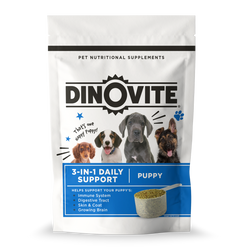How to Help Upset Stomach in Dogs Quickly

Fast-Acting Remedies for Dog Tummy Troubles
When your dog has an upset stomach, you’ll do anything to help them get back to their normal selves. Whether it's vomiting, diarrhea, or other upset stomach issues, digestive distress can leave you feeling helpless.
Good news: there are home-based steps you can take right away that may ease your dog’s stomach issues. In this guide, we’ll walk you through the signs of digestive upset, fast remedies, and when it’s time to call the vet.
Signs of Upset Stomach in Dogs
Before jumping into treatment, make sure you recognize the signs. Dogs can’t tell us when their tummy hurts, but their body language and behavior will clue you in.
The most common signs of an upset stomach in dogs are:
- Vomiting or retching
- Diarrhea or loose stools
- Excessive drooling or licking lips
- Lack of appetite
- Lethargy or hiding
- Gurgling sounds from the belly
- Eating grass or licking floors
If your dog is experiencing these symptoms but otherwise seems stable, you can likely start with home care. Contact your vet immediately if symptoms are severe or last more than 24 hours.
Fast Your Dog
Withhold food for 12–24 hours. Fasting can reduce inflammation and help clear whatever is irritating their stomach.
*Pro Tip: Fresh water should always be available during fasting!
Keep Your Dog Hydrated
Hydration is critical, especially if vomiting or diarrhea is involved. But drinking too much water at once can make things worse.
- Offer small amounts of water frequently
- Try ice cubes if your dog refuses to drink
- Add a splash of bone broth for flavor and gut-soothing minerals
- Bone broth is gentle, nourishing, and helps replenish fluids while giving your pup something comforting to sip.
Feed Your Dog Canned Pumpkin
After fasting, one of the gentlest foods to reintroduce is plain canned pumpkin (not pumpkin pie filling). It’s packed with soluble fiber that helps regulate digestionwhether your dog has diarrhea or constipation. It can be mixed with their regular food or added to bland diet foods.
- Small dogs: 1 tsp per meal
- Medium dogs: 1–2 tsp
- Large dogs: 1–2 tbsp
- Giant dogs (90+ lbs): 2–4 tablespoons per meal
What is Best to Feed a Dog with an Upset Stomach?
Start with bland, easily digestible meals after fasting. The go-to option? Boiled chicken and white rice. This combo is:
- Low-fat and gentle on the stomach
- Free from additives and seasonings
- Easy on the digestive tract while still providing nutrition
Feed small portions over a couple of days, then gradually reintroduce their regular diet.
How to Settle a Dog’s Upset Stomach
Looking for home remedies that work? Here are some gentle remedies that may help your dog feel better quickly.:
- Bone broth: Nourishing and hydrating
- Pumpkin: Great for regulating digestion
- Probiotics for dogs: Help restore balance in the gut
- Herbs like ginger or chamomile: May soothe the stomach, but always consult your vet before use
-
Plain Greek yogurt: In small amounts, can provide beneficial bacteria. Absolutely no sugar or sugar substitutes.
What to Give a Dog for Upset Stomach or Vomiting
If your dog has just vomited but otherwise seems okay:
- Begin with fasting and hydration
- Introduce ice chips or bone broth
- Follow up with bland meals
- Monitor closely for any worsening symptoms
- Never administer medications without checking with your vet first.
How Long Does an Upset Stomach Last in Dogs?
Most mild cases resolve within 24 to 48 hours with proper care. If symptoms last longer or worsen it could be something more serious like:
- Parasites
- Pancreatitis
- Foreign body ingestion
- Allergic reaction
- Underlying disease
Always call your vet if your dog has bloody vomit or stool, extreme lethargy, or shows signs of pain.
How Do You Treat an Irritated Dog’s Stomach?
Holistic care is key for pet parents. In the short term, focus on:
- Fasting and hydration
- Bland foods and pumpkin
- Probiotics or bone broth
For long-term gut health, consider adding a supplement like Dinovite to your dog’s daily routine. With ingredients like prebiotics, probiotics, ground flax seed, and dried kelp, it’s designed to support digestive health and turn any pet food into a complete meal.
When to See a Vet
Call your vet immediately if:
- Vomiting or diarrhea is continuous or severe
- You see blood in stool or vomit
- Your dog is lethargic, bloated, or in pain
- Symptoms last more than 48 hours
Final Thoughts
Upset stomach in dogs is commonbut with fast action and a gentle touch, your pup will likely bounce back quickly. Keep pumpkin, bone broth, probiotics, and plain chicken and rice on hand, and you’ll always be ready to help your dog through a rough tummy day.
*All information on this website is for educational purposes only and is not intended to replace the expert advice of a veterinarian or veterinary practitioner.
Related Products

.png)

